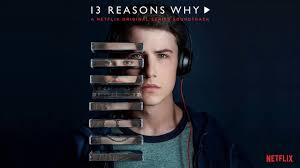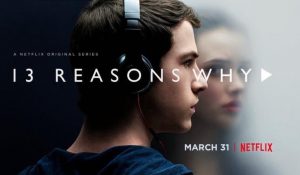This article considers the potential positive and negative influence of the hit TV series, 13 Reasons Why, on young people’s mental health and wellbeing
[Spoiler alert – some plot lines revealed]
How could TV producers justify their graphic depiction of the suicide of a 17-year-old girl, a recognized risk factor for copycat suicidal behaviour? As many parents of older teens will know, this scene is central in the Netflix series 13 Reasons Why, released worldwide two months ago. The striking popularity of this show amongst older teens, despite the darkness of its content, suggests the potential importance of parents being informed about it.
Each of 13 episodes spells out how a different individual acted in a hurtful way that ultimately influenced Hannah, an intelligent, witty, socially skilled and attractive girl, to take her life. Her peers’ transgressions varied from misunderstanding, lies and bullying behaviour to repeated sexual assaults. She carefully plans to posthumously confront each of her transgressors by recording 13 cassette tapes that they must listen to after her death if they are not to be publicy outed.
Despite reservations, I believe 13 Reasons Why has much to offer. Its huge recent popularity reflects its entertainment value – it’s dramatic, intriguing and well acted. By engaging teens and young adults it has led to much greater discussion about suicide and related themes amongst their peers. This may help normalize the experience of emotional distress and help sufferers feel they are not alone.
The series also admirably aims to highlight the potential serious and perhaps unwitting consequences to others of bullying, teasing, social exclusion and thoughtlessness. Many episodes invite viewers to reflect on serious moral dilemmas. It has a male central actor, Clay, who models an uncommon balance of vulnerability, yet consistent integrity. There’s a degree of complexity or ambiguity in how characters are portrayed, even when they have clearly wronged others. It prompts us to think about what is most important to our relationships and well-being.
The series also highlights the harmful disconnection that may exist between many teenagers and their parents, including those who undoubtedly care greatly for their well-being. I think the series may be of particular benefit if it encourages further connection and conversation between teenagers and their parents, perhaps including discussion of challenging topics in the episodes they have watched together.

My main qualms about the series relate to some of its implicit messages. It essentially depicts someone acting out a revenge fantasy whilst ending their life to end their emotional pain – this models some exceptionally harmful choices to those who identify with the main character. Each single episode is based on Hannah pointing the finger at an individual who she views as having transgressed against her with the recurring suggestion that they are all responsible for her death. This blurs the boundaries between adolescent hurt resulting from distressing misunderstandings with peers to predictably severe psychological trauma resulting from rape. Hannah’s demeanour, resourcefulness and ongoing capacity to engage with others did not seem consistent with real-life presentations of those who are most actively suicidal, and may lead to exaggerated concerns about suicidality in other teens.
When Hannah saw the school counsellor, pursuing a more healthy choice, it failed to help. Sadly, the counsellor was so breathtakingly incompetent and clueless about trauma reactions that his main advice to help her deal with rape was basically to “just get over it”. This may have helped the dramatic narrative, but it would hardly encourage emotionally overwhelmed teenagers to seek professional help. The counsellor over-focused on her painful emotions whilst offering no direction, strategies or feedback about things that could be done to predictably ease her distress whilst mobilising further support. This would have modelled a more typical and vastly more helpful outcome.
In contrast to Nietzsche’s famous claim that “what doesn’t kill you makes you stronger”, 13 Reasons Why seems to suggest “what doesn’t kill you outright may kill you bit by bit”. This is the antithesis of stoic philosophy, which highlights how we can learn to choose perspectives and act in ways that can dramatically ease our distress and improve our well-being. Such understanding is central to cognitive-behaviour therapy that revolutionized advances in evidence-based mental health treatment from the 1970’s onwards.
The show’s justification will ultimately depend on its potentially measureable influence on teen self-harm, suicidal and help-seeking behaviour. Do teens think more about what impact their bullying, or even unwitting slights, might have on others? Do parents pick up on the importance of being engaged with their teens, even if their involvement might seem unwanted and a bit intrusive. For parents, I would suggest restricting the series’ viewing only to older students who want to see it (Year 10 and up), and preferably viewing it together.
Also see our blog on dealing with suicidal thoughts
Related
Rising Above Bullying – One Teen’s Story (video)
Tackling Challenging School Issues
Existential Depression in Young Men

